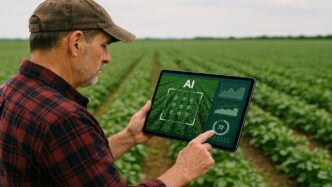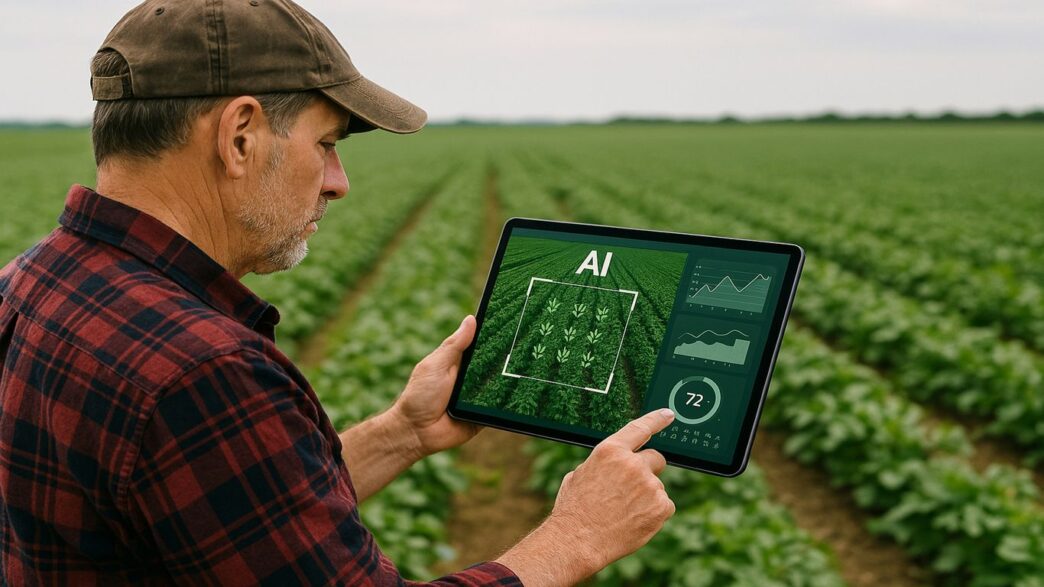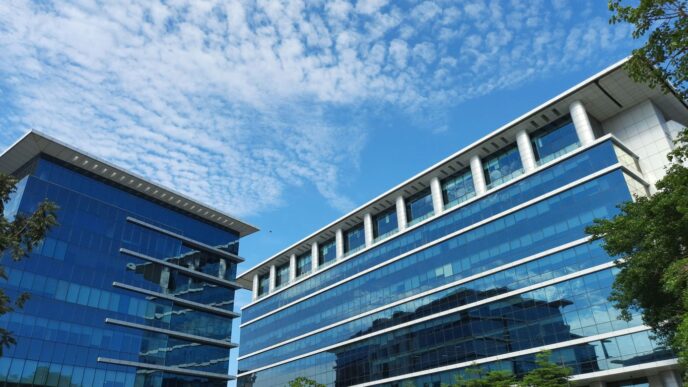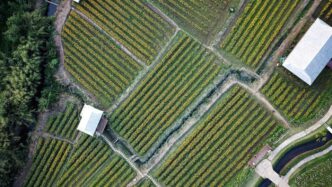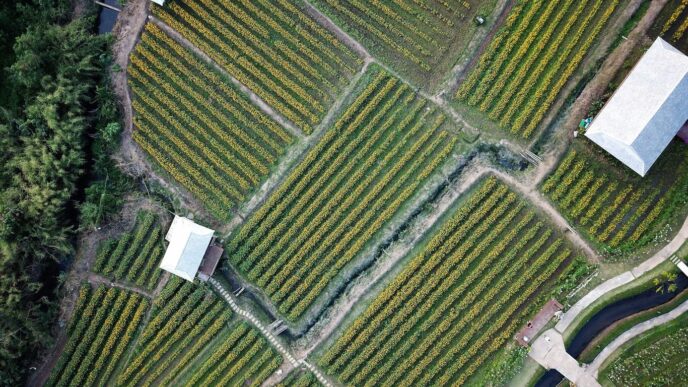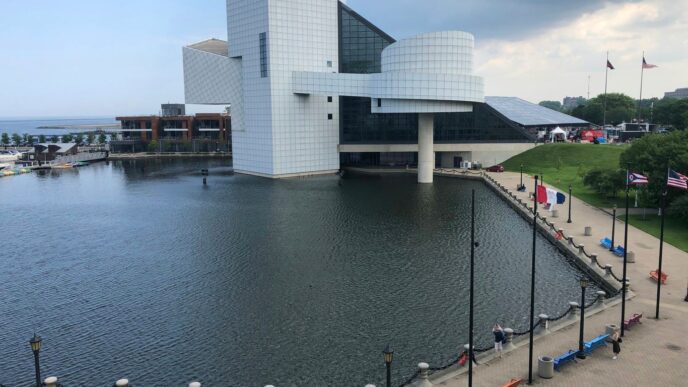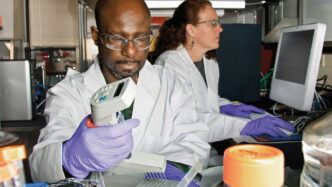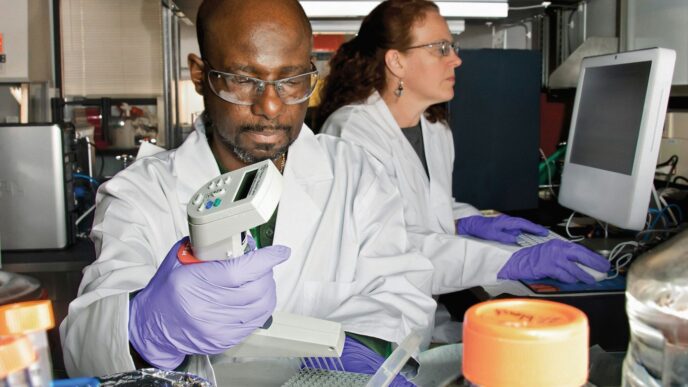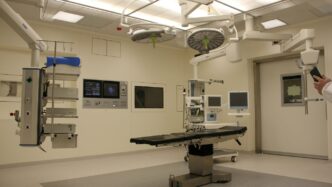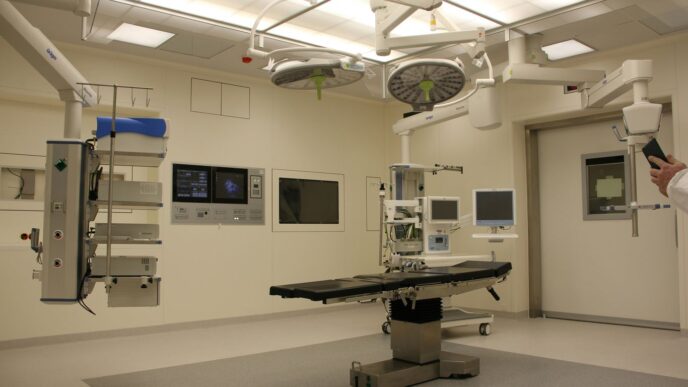Farming is changing, and fast. We need to grow more food for everyone, but also take better care of the planet. That’s where companies like Bayer Crop Science come in. They’re working on new ways to help farmers grow crops, protect them from problems, and do it all in a smarter, more sustainable way. It’s all about using science and technology to make farming work better for us and for the environment, especially as we look ahead to what farming will be like in the coming years.
Key Takeaways
- Bayer Crop Science is developing advanced crop protection methods that use less chemical product and target pests more precisely.
- The company is using gene editing and new breeding techniques to create crops that can better handle tough weather and resist diseases.
- Climate FieldView™ is a digital platform from Bayer that helps farmers manage their fields using data, leading to more efficient farming.
- Bayer is investing in biological solutions and farming practices that work with nature, like regenerative agriculture, to improve soil health.
- Bayer Crop Science is focused on educating farmers and making sure they have access to the tools and knowledge needed to adopt these new farming methods.
Bayer Crop Science: Driving Agricultural Transformation
It feels like agriculture is changing faster than ever these days, right? We’ve got a growing world population to feed, and on top of that, the weather’s getting pretty unpredictable. Plus, everyone’s talking about being more sustainable. It’s a lot for farmers to juggle.
Bayer Crop Science is really trying to get ahead of these challenges by focusing on innovation. They’re not just making new products; they’re looking at how everything works together – from the seeds in the ground to the data coming off the tractors. It’s about making farming more efficient and, hopefully, a bit kinder to the planet.
Shaping Agriculture for 2025 and Beyond
Looking ahead, Bayer is putting a lot of effort into making sure farming can keep up. They’re working on seeds that can handle tough conditions, like not enough water or too much heat. They’re also developing ways to protect crops that use fewer chemicals and are applied more precisely. Think of it like giving each plant exactly what it needs, when it needs it.
Addressing Global Food Security Challenges
This is a big one. With more people on the planet, we need to produce more food. But we can’t just keep using more land or more resources. Bayer’s approach involves using science to boost how much food we can grow on the same amount of land. This includes things like:
- Developing crops that naturally resist pests and diseases.
- Improving the nutritional value of staple crops.
- Finding ways to grow crops in areas that were previously too difficult.
The Critical Role of Innovation in Modern Farming
Honestly, without new ideas, farming would probably stay stuck in the past. Bayer is investing in a few key areas:
- New Crop Protection: Creating smarter ways to deal with weeds, bugs, and diseases that are also better for the environment. They’re even looking at biological solutions, which are basically nature’s own pest control.
- Seed Technology: This is huge. They’re using advanced breeding techniques, including gene editing, to create crops that are tougher, grow better, and have more nutrients.
- Digital Tools: This is where things like Climate FieldView™ come in. It’s all about using data from the farm to make better decisions, from planting to harvesting. It helps farmers use resources like water and fertilizer more wisely.
Pioneering Crop Protection Innovations
Bayer Crop Science is really pushing the envelope when it comes to keeping our crops safe and healthy. It’s not just about spraying stuff anymore; it’s way more targeted and smart.
Next-Generation Precision Crop Protection
This is all about using technology to apply crop protection products exactly where and when they’re needed. Think sensors, data, and smart machines working together. The goal is to use less chemical product overall, which is good for the environment and the farmer’s wallet. We’re talking about reducing chemical use by maybe 35% and cutting down on spray drift by as much as 60% with these new methods. It means less waste and better protection for things like pollinators.
Sustainable Biologicals and Integrated Pest Management
Beyond the usual chemical solutions, Bayer is also investing a lot in biologicals. These are products derived from natural sources, like beneficial microbes or plant extracts, that help manage pests and diseases. They work hand-in-hand with traditional methods in what’s called Integrated Pest Management (IPM). This approach aims to reduce reliance on synthetic chemicals by up to 45%, using a mix of strategies to keep pests in check. It’s a more balanced way to protect crops.
The CropKey Approach to Product Discovery
This is a pretty big deal. CropKey is a new way Bayer is finding and developing crop protection products. Instead of just trying to make something that works, they’re designing molecules with specific safety and sustainability profiles right from the start. It’s like building a product with a pre-set blueprint that meets high standards for how it interacts with the environment and living things. This profile-driven discovery means they can create solutions that are not only effective but also designed to be safer and more sustainable from the ground up. It’s a more thoughtful process for creating the next generation of crop protection.
Advancements in Seed Technology and Genetics
Seed is really the starting point for everything in farming, isn’t it? Bayer Crop Science puts a lot of effort into making seeds better, focusing on creating crops that can handle tough conditions. They’re using some pretty advanced tech to do this.
Accelerating Resilient Crop Development
Bayer’s global breeding program is all about making seeds tougher and more productive. They’re using advanced breeding tools, combining different technologies like biotech and gene editing to create seeds that can deal with a changing climate. The goal is to help farmers grow more food using fewer resources. They’re even looking at reducing the time it takes to develop new products, aiming to cut down breeding cycles significantly. This means getting better seeds into farmers’ hands much faster.
Gene Editing for Enhanced Crop Traits
Gene editing, using tools like CRISPR, is a big deal here. It helps speed up the process of developing crops that are more resistant to things like drought, heat, and pests. They’re also using marker-assisted selection, which is a precise way to breed crops like corn and soybeans for better yields and more nutrients. It’s not just about making crops grow bigger, but also making them healthier and more efficient. This focus on genetics is seen as key to meeting food security needs, especially in areas that are more affected by weather changes. For example, they’ve worked with partners on projects like CoverCress, which uses gene edits to improve the oil and protein in a plant, turning it into a useful cover crop for biofuels and soil health. It’s pretty neat how they’re turning what was once a weed into a valuable crop.
Improving Yields and Nutritional Content
When Bayer talks about improving seeds, they’re really thinking about what farmers need. They look at things like drought tolerance and how well a crop can resist diseases. It’s not just about getting a higher yield, though that’s important, but also about managing risks that can affect a farmer’s profit. They consider all the regional challenges, like weather patterns and soil conditions, when they’re developing new seed products. This means creating seeds that have a good balance of potential yield and the ability to handle problems. They’re also looking at how to make crops more nutritious, which is good for everyone. It’s a whole system approach to seed development, trying to make farming more profitable and sustainable. You can see how these advancements are critical for future farming needs.
| Innovation Area | Technology Used | Estimated Yield Improvement (%) | Key Benefit |
|---|---|---|---|
| Seed Genetics & Gene Editing | Gene Editing (CRISPR), Marker-assisted Breeding | 20–25% | Climate resilience, improved nutrition |
| Precision Breeding | Advanced Breeding Tools, Genomics | Expected 2x genetic gain by 2030 | Faster product development, tailored traits |
Digital Farming and Data-Driven Solutions
Climate FieldView™: A Comprehensive Digital Platform
Farming today is way more complicated than it used to be. You’ve got changing weather, new pests, and the constant pressure to produce more food. That’s where digital tools come in, and Bayer’s Climate FieldView™ platform is a big player here. It’s basically a way to bring all your farm data together in one place. Think of it like a central hub for everything happening on your land. You can see field maps, track what you planted, when you applied fertilizer or pesticides, and even how much rain you got. This kind of information helps you make smarter choices about what to do next. It’s not just about collecting data, though; it’s about making that data useful for day-to-day decisions.
Leveraging AI and IoT for Farm Management
Beyond just tracking what’s happened, the real magic is in using new tech like Artificial Intelligence (AI) and the Internet of Things (IoT) to actually manage your farm better. IoT devices, like soil sensors or weather stations dotted around your fields, constantly send information back. AI then takes all that data – from the sensors, from satellite images, from your own records – and starts to spot patterns. It can tell you if a part of your field is getting too dry, or if a certain pest is showing up. This means you can act fast, maybe watering a specific area or treating a small patch of pests before it becomes a big problem. It’s like having a really smart assistant who’s always watching over your crops.
Real-Time Insights for Optimized Operations
What farmers really need is information when they need it, not days later. That’s what real-time insights are all about. Imagine getting an alert on your phone that says, "Hey, the corn in Field 3 is showing early signs of nitrogen deficiency." Or, "There’s a high chance of frost tonight in the lower fields, consider covering your vulnerable crops." This kind of immediate feedback, often delivered through apps or dashboards, lets you adjust your plans on the fly. It helps you use resources like water and fertilizer more efficiently, reducing waste and saving money. Plus, it can help you get ahead of problems, meaning less stress and potentially better yields at harvest time. It’s about making farming more precise and less of a guessing game.
Commitment to Sustainable and Regenerative Agriculture
Bayer Crop Science is really focused on making farming better for the long haul. It’s not just about getting crops out of the ground today, but making sure the land can keep producing for years to come. This means looking at how we farm and trying to improve things, not just for the farmer’s wallet, but for the planet too.
Promoting Regenerative Agriculture Programs
We’re putting a lot of energy into regenerative agriculture. Think of it as farming that gives back to the land. This involves practices like planting cover crops, which protect the soil and add nutrients, and reducing how much we till the soil. We also encourage multi-cropping and crop rotation, which helps keep the soil healthy and breaks pest cycles. The goal is to build farming systems that are tough and can handle changes, like different weather patterns. We’re working on programs to help farmers make this shift, offering support and incentives because we know it’s a big change.
Enhancing Soil Health and Carbon Sequestration
Healthy soil is the foundation of good farming. We’re looking at ways to boost soil health, which includes increasing the organic matter in the soil. This is important because healthier soil holds more water and nutrients, and it can also pull carbon dioxide out of the air and store it. We’re exploring different methods to help farmers do this, like using specific tools and techniques that improve soil structure over time. It’s a slow process, but the benefits for the farm and the environment are significant.
Reducing Environmental Footprint Through Innovation
Innovation plays a big part in cutting down how much farming impacts the environment. We’re developing new ways to use resources more wisely. For example, we’re looking at ways to reduce water use through better irrigation scheduling and choosing crops that are better suited to local climates. We also focus on responsible use of crop protection products, making sure they are used effectively and don’t harm the surrounding environment. Our work with digital tools for modern farming helps farmers make smarter decisions about when and where to apply treatments, which can significantly lower chemical use and reduce waste.
Empowering Farmers Through Education and Access
Expanding Digital Literacy and Scientific Outreach
It’s not enough to just invent new tech; farmers need to know how to use it. Bayer is putting a lot of effort into making sure folks understand the latest farming methods. They’re doing this through online classes, demo farms where you can see things in action, and other learning platforms. This is especially important for farmers in places where new technology hasn’t reached yet. Think of it like getting a new smartphone – you need a little help figuring out all the cool features, right? Bayer is providing that help.
Improving Access to Tools and Finance
Getting the right seeds, the best crop protection, and the latest digital tools can be tough, especially for smaller farms. Bayer is working to make these things more available. This includes helping farmers get loans or financial support so they can afford the new technologies. The goal is to level the playing field, so everyone has a chance to use what can help them grow more and farm better.
Facilitating Knowledge Transfer for Best Practices
Farming is always changing, and knowing the best way to do things is key. Bayer shares information on how to use their products effectively and how to manage crops in ways that are good for the land. This might involve:
- Learning about new seed varieties that can handle tough weather.
- Understanding how to use biological pest controls alongside traditional methods.
- Getting tips on how to improve soil health for the long run.
This kind of knowledge sharing helps farmers make smarter choices, leading to better harvests and a healthier environment.
Bayer Crop Science: Looking Ahead
So, Bayer Crop Science is really pushing the envelope when it comes to farming. They’re putting a lot of effort into new seeds, better ways to protect crops, and using data to help farmers make smarter choices. It’s clear they see the big picture – feeding more people while also taking care of the planet. Their work with digital tools and sustainable practices seems to be setting a good direction for agriculture. It’s going to be interesting to see how these innovations play out on farms everywhere in the coming years.
Frequently Asked Questions
What is Bayer Crop Science?
Bayer Crop Science is a part of Bayer, a big company that works with science and health. This part focuses on farming, helping farmers grow more food using new ideas and tools. They offer things like better seeds, ways to protect plants from bugs and diseases, and digital tools to help manage farms.
Why is innovation important in farming today?
Farming needs new ideas because the world’s population is growing, and we need to feed more people. Also, the weather is changing, making it harder to grow crops. Farmers need new ways to grow food that use less water and protect the soil, so we can have enough food for everyone now and in the future.
How do Bayer’s new seeds help farmers?
Bayer is creating seeds that can handle tough conditions, like not enough rain or too much heat. They use smart science, like gene editing, to make crops stronger and grow better. This means farmers can get more food from their fields, even when the weather is difficult.
What is Climate FieldView™?
Climate FieldView™ is a special computer program that helps farmers make smart decisions. It uses information from satellites and sensors in the fields to tell farmers about their soil, if plants are healthy, and if there are any problems like bugs. This helps farmers use water and fertilizer more wisely.
What does Bayer do for sustainable farming?
Bayer is working on ways to farm that are good for the Earth. This includes using natural ways to protect plants, like using helpful bugs instead of chemicals. They also help farmers use practices that make the soil healthier and can even help capture carbon from the air, which is good for fighting climate change.
How does Bayer help farmers learn new things?
Bayer believes in sharing knowledge. They offer training and support to help farmers learn about new technologies and farming methods. They also work to make sure farmers can get the tools and resources they need to succeed, especially in places where farming is just starting to use new ideas.

